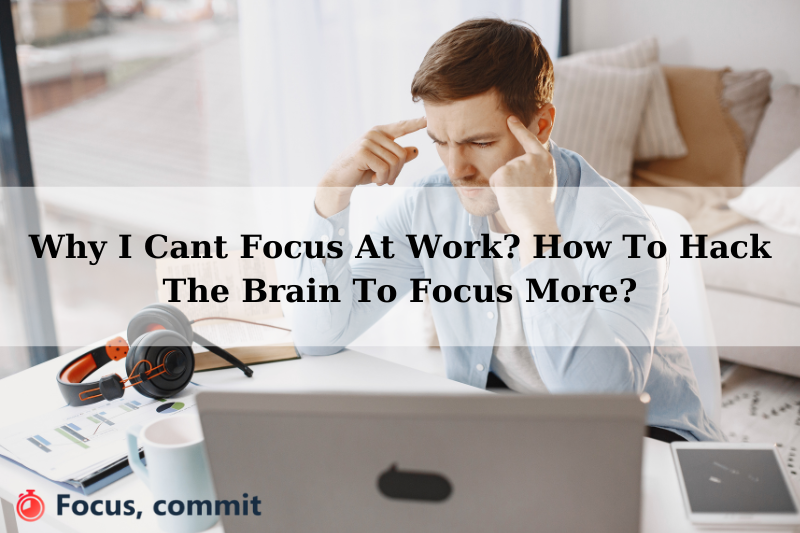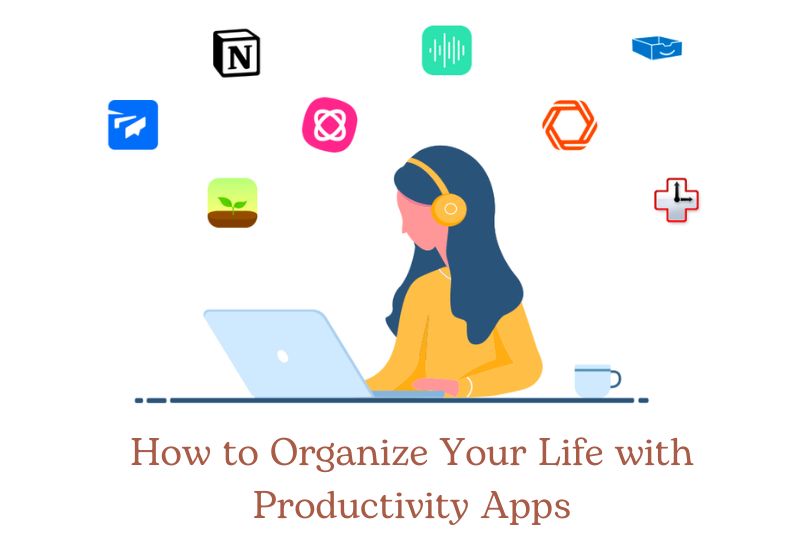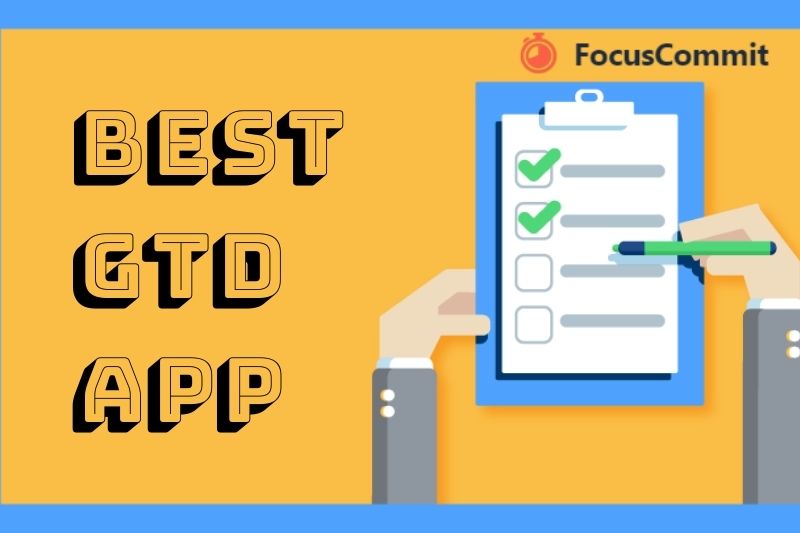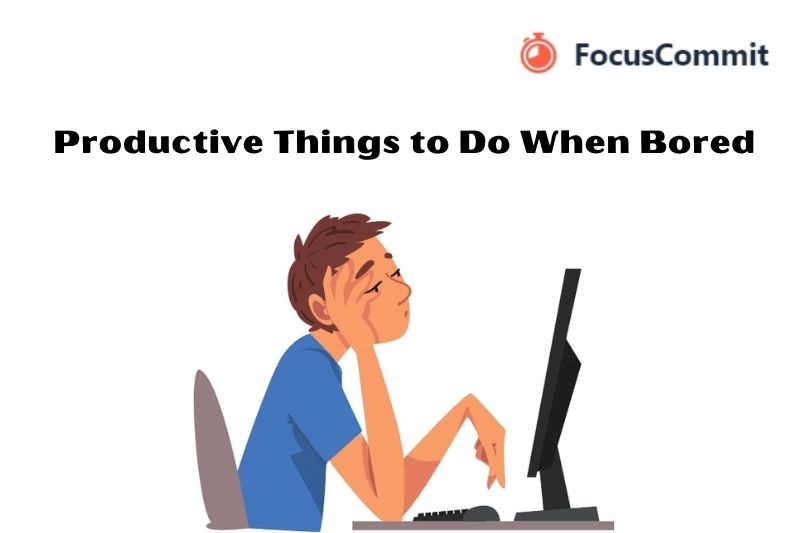There are many reasons why people can’t focus at work. For some, it may result from poor work/life balance. For others, it may be due to distractions in the environment. And for still others, it may result from their biology. This article discusses Why you have difficulty concentrating at work and how to hack your brain to focus more.
The Signs Of Being Unable To Focus
You may have difficulty concentrating or focusing due to various signs and trouble recalling recent events if your short-term memory isn’t good. You will lose track of important information and find it difficult to focus on the task. And you struggle to make decisions or lack the energy to do so.
It could be more than feeling “off” or having a bad week.

It’s easy to see signs of can’t focus at work. These symptoms include:
- Trouble remembering details from just a few seconds ago.
- Restlessness and inability to sit still for too long without moving.
- Quickly lose things or forget what you entered a room to do.
- You can procrastinate to the point that you miss important deadlines or meetings.
- A constant feeling of numbness is known as “brain fog”.
- It isn’t easy to do simple or complex tasks.
- Feeling unable to think clearly or make quick decisions.
- Making poor decisions and being too clumsy.
- It is difficult to let go of your work life because completing tasks at the office seems impossible.
- You may find yourself dissociating or zoning out constantly despite not working.
7 Reasons You Can’t I Focus At Work?

1. Sleep Deprivation
For proper cognitive function, the brain requires adequate rest and sleep. Numerous studies have shown that poor sleep habits can lead to memory recall, focus, memory recall, attention, and retention problems. Your already tired body may be further stressed by high blood pressure.
Sometimes, even the most mundane tasks seem daunting because you’re too tired. It could be because you are overworked, stressed, or have hormonal imbalances. It doesn’t matter what reason. People must get at least six to ten hours of sleep each night.
2. Technology
We live in an age of technology and are constantly distracted, making concentrating difficult. The advent of technology has brought social media, mobile devices, and many more screens into our lives, which keeps us from the things that matter.
Today, more than 40% of people spend their day on mobile devices or computers. This is a very unhealthy level and is a big reason you can’t focus at work.
3. It’s not what you like to do
Many suggest that pursuing a career or tasks aligned with your passions can be a powerful motivator. When you genuinely love what you do, it becomes easier to maintain focus because you have a natural interest and enthusiasm for the work.
Passion-driven work often taps into intrinsic motivation, the internal desire to engage in an activity for its own sake. Intrinsic motivation can enhance concentration and dedication to tasks.
Example: An artist who loves painting may find it easier to stay focused on their art for extended periods because they are genuinely passionate about it.
4. Multitasking is possible
Often, individuals find themselves faced with overwhelming workloads. This can manifest in many ways, such as multiple projects, tight deadlines, or a high volume of daily work. As these responsibilities pile up, allocating the mental resources needed to focus on each task becomes difficult.
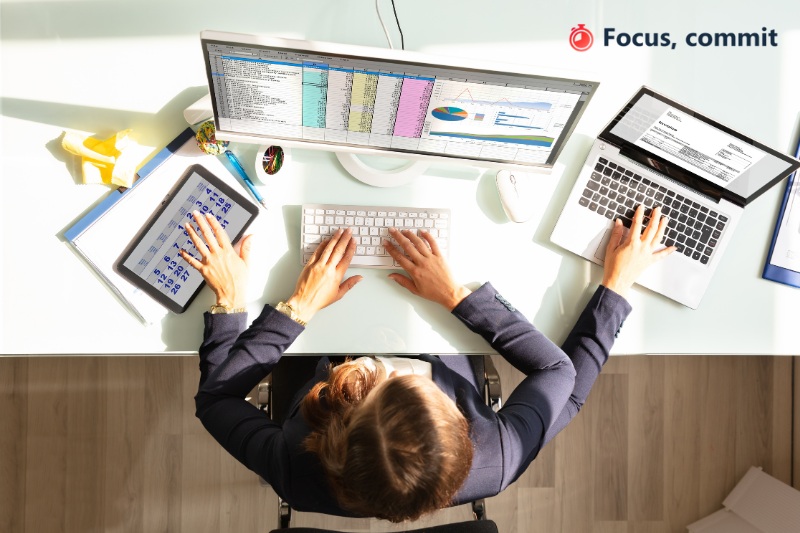
For example, Imagine a project manager with several projects with strict deadlines, client meetings, and team coordination. Carrying out all these tasks can lead to overload. Overload often leads to increased levels of stress and anxiety. Ultimately, the inability to concentrate definition on work due to stress and anxiety can lead to decreased productivity. When tasks take longer to complete or are not performed efficiently, it can lead to substandard results.
5. Stress and Anxiety
Anxiety and stress can lead to anxiety-related symptoms such as worry, constant worrying, preoccupation with your thoughts, or dissociation from reality. Pressure can cause you to lose touch with your present, making it lack of concentration.
Stress can lead to losing focus if you have experienced trauma or been in a highly polarized setting. Stress can sometimes affect your ability to focus, primarily if you work.
6. Mental Health Problems
Mental health conditions like ADHD or PTSD can often cause a loss of focus. Individuals who experience a loss of focus should also be evaluated for possible mental health conditions.
In some cases, a lack of focus may also be caused by a vitamin or nutrient deficiency. Vitamin B deficiency is the leading cause of brain fog and lackluster direction.
Vitamin B is linked to enhanced cognitive function, while Vitamin C and Vitamin D are vital for supporting focus. These vitamins can cause problems with focus and slow down the brain.
7. Hormonal Imbalance
Sometimes hormonal imbalances can lead to a dramatic change in your ability to focus. The brain is an organ that relies on a chemical function to accomplish many things.
Hormonal imbalances can cause feelings of anger, dissatisfaction, and depression. These hormone imbalances can negatively impact your ability to focus and cause cognitive dysfunction.
What To Do When You Can’t Focus At Work?

1. Eliminate distractions
First, you need to get rid of distractions. You can’t eliminate all distractions, but can reduce or eliminate as many as possible.
Start with the basics like:
- Moving to a quieter area
- Turn off all notifications or turn off your phone completely.
- Close the door to your office
- Tell those around you not to distract you for a time.
- It would help to close any programs and apps you don’t need on your computer.
2. Small amounts of coffee
According to a study from 2010, small amounts of coffee or other caffeinated beverages may improve your focus.
Taking advantage of caffeine’s cognitive-enhancing qualities is essential by consuming it in moderation. You may feel anxious or nervous if you drink too much caffeine. This can reduce your ability to focus.
3. Use the Pomodoro technique
Focusing helps you do more in less time. Although it sounds easy, it cannot be easy to practice. The Pomodoro technique is a great way to increase your attention span the next time you have trouble paying attention.
This timing method can train your brain to stay on task for shorter periods. Here’s how to stay focused:
- Start your timer for 25 seconds and get to work.
- Take a 5-minute rest when the buzzer goes off.
- Next, start the timer and go back to work.
- After completing four rounds, you can rest more, around 20-30 minutes.
4. Social media locked down
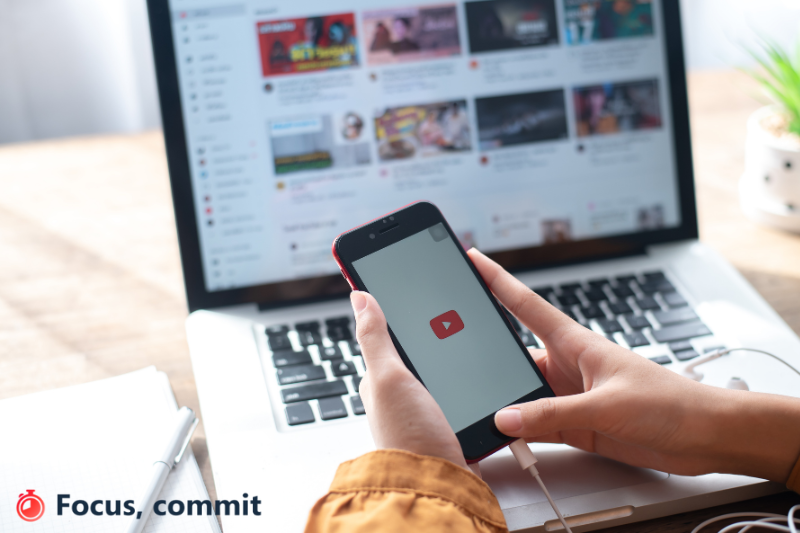
An app that blocks social media may be the best option for you if your idea of a break is to check Facebook and Instagram every five minutes.
There are many apps available that can be used on your smartphone, tablet, and computer. These distraction-busting apps can block social media and sites and apps like YouTube, Netflix, and Amazon.
Freedom, AppBlock, and FocusMe are some of the most popular social media blocking tools.
5. Your body needs fuel
We all know what happens to us when we feel “hunger”. This combination of anger and hunger is a major failure.
Don’t delay or skimp on meals to keep your brain sharp, energy, and emotions in check.
To stay fueled, lean, balanced protein and complex carbs with healthy fats. Eat fresh fruits, vegetables, nuts, and seeds if hungry. Make sure to drink plenty of water.
Harvard Medical School recommends including some of these “best brain foods” in your daily routine to give you an extra boost.
- Broccoli, spinach, and kale are all green leafy vegetables.
- Salmon is a fatty fish.
- Blueberries, strawberries, and raspberries are all good berries.
- Walnuts
- Moderation in your caffeine intake from tea and coffee
6. Get enough sleep
It is no secret that most Americans lack sleep. Although it’s okay to get a few hours of sleep on nights when you are not sleeping well, getting enough sleep every night can hurt your short- and long-term memory and your ability to concentrate.
Adults between 18 and 60 should sleep 7 hours or more each night. Adults over 60 may require up to 9 hours of sleep per night.
You can improve your sleep quality by:
- After lunch, avoid caffeinated beverages.
- Turn off all electronic devices at least an hour before bedtime. These devices can stimulate your brain and make you feel sleepy.
- Relax and take some time to unwind. Relax with a book, a warm bath, or soothing music.
- Your bedroom should be kept calm and quiet. The ideal temperature is 60-67 degrees Fahrenheit (15.6 to 19.4 degrees Celsius).
7. Set SMART goals
You may feel overwhelmed by a complicated project and lack of focus. Try breaking it down into smaller pieces and then plugging them into the SMART formula.
SMART stands as:
- Specific. What exactly must be accomplished?
- Measurable. How can you track your progress?
- Achievable. Is it possible? Is it possible to do it by the deadline?
- Relevant. What role does it play in the overarching strategy or larger goal?
- Timely. When is it necessary?
You can increase focus and concentration by breaking a complex project into smaller tasks. This is because you feel empowered to achieve your goals.
8. Be more mindful

Distracted thinking is a common problem that we all face.
These short mental breaks can make concentrating on the task at hand difficult. Mindfulness is a great tool to help you focus on the task.
According to Mayo Clinic, mindfulness is a state of mind that allows you to be present in the moment and aware of what’s happening around you. This is excellent news for those who are trying to keep their focus.
You can quickly return your focus to the right place by being mindful and alert to your mind when your attention drifts. You can train your brain to become more cognizant through breathing techniques, meditation, conservative movement, and yoga.
9. Make a to-do list
Let’s face facts. It’s easy to accumulate a lot of things on your to-do lists. Finding the motivation and energy to complete your goals can be challenging.
Good news! Research shows that having a written plan can help increase productivity.
Once you have made your list, pick two or three essential tasks to place at the top. Next, rank the remaining items according to their importance. This will allow you to complete urgent tasks while your brain is fresh and your energy is high.
10. Focus on similar tasks
Are you tired of switching between different types of thinking? Pick tasks that are similar and group them. Then, do one job at a time. By not jumping from one study to the next, you will find it easier to transition between charges and get more done.
Despite what you might think, multitasking isn’t more efficient or effective than doing one thing at a time, especially if you struggle to stay focused. According to the American Psychological Association, multitasking can reduce productivity by up to 40%.
Ultimately, it’s vital to remember that can’t focus at work is not a personal failing but a common challenge many face today. Acknowledging these hurdles and implementing effective strategies can pave the way for a more productive, fulfilling, and focused work life.
